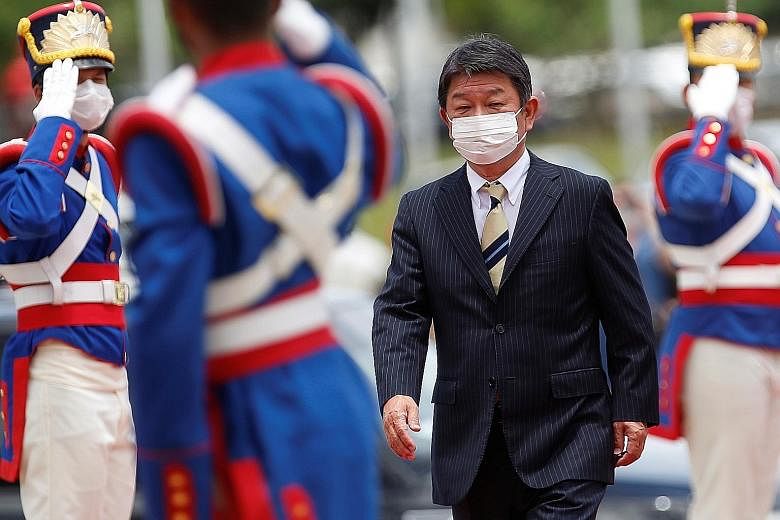History is dotted with plagues that have triggered a paradigm shift in the balance of power, Japanese Foreign Minister Toshimitsu Motegi said yesterday as he stressed the need to look to the past for lessons on how the world might emerge from the Covid-19 pandemic.
Warning that the global power balance has been "swinging yet more violently" with Covid-19, highlighted by strategic competition in areas like technology and even vaccines, he signalled in a keynote policy speech at the second Tokyo Global Dialogue of Japan's intent to "take the lead in building a post-Covid-19 global order".
Japan is corralling like-minded partners in its pursuit of a rules-based global order as spelt out in the three pillars of its Free and Open Indo-Pacific (FOIP) concept - rule of law and freedom of navigation, quality infrastructure, and capacity building - that many observers say is to counter Chinese attempts at redefining the status quo.
But Japan is also a neutral arbiter that has singled out its partners for breaking the rules. It has criticised the European Union after the group said it may block vaccine exports until enough supplies are secured for the bloc.
"It will be dangerous if someone takes advantage of the Covid-19 crisis to justify the already existing protectionist sentiments that have surfaced in many parts of the world. I must re-emphasise the importance of acting in accordance with international rules and driving the efforts at rule-making that will ensure stability for the coming age."
He cited the two pandemics in pre-modern Europe - in the sixth and 14th century - that shifted the centre of gravity from the worst-hit areas to regions that were relatively unscathed. In Japan, a smallpox pandemic in the eighth century that killed a third of its people brought a change in the power balance among the aristocracy, eventually creating the samurai class and the feudal shogunate system.
Looking to history presents evidence that Covid-19 could tilt the global power balance in favour of China - the only major economy in the world to grow last year - while also offering new avenues of growth, which include digital transformation and climate change.
"If an emerging power behaves in accordance with internationally established rules and cooperates in building a new international order, the post-Covid-19 world will be able to regain stability. In reality, however, we have long been witnessing attempts by one party to coerce others into accepting one's self-declared positions and alter international norms in accordance with its own principles," he added in what was clearly a dig at China.
In yet another thinly veiled criticism of China's vaccine diplomacy, he deplored the use of vaccines "as an arbitrary diplomatic means to leverage recipient countries towards taking a position favourable to it".
Looking forward, Japan's foreign policy is geared towards greater emphasis on multilateral frameworks like the Quad - the United States, Japan, Australia and India. Their foreign ministers last week vowed to work closely with Asean and Europe to further the FOIP concept.
Mr Motegi visited six African and five Latin American countries from December to January to discuss FOIP. He said: "An increasing number of countries now share the recognition of the importance of the rule of law and rules-based actions instead of rule by force."
At a separate panel discussion, former Singapore ambassador Bilahari Kausikan observed that while no country will ever shun China, Beijing's behaviour has fanned anxieties that have led to a "nascent, informal global coalition of countries with concerns about China". A Chinese expert, Professor Shi Yinhong of Renmin University, felt the amount of strategic space being "permitted" to Beijing has been incompatible with its size and population.

